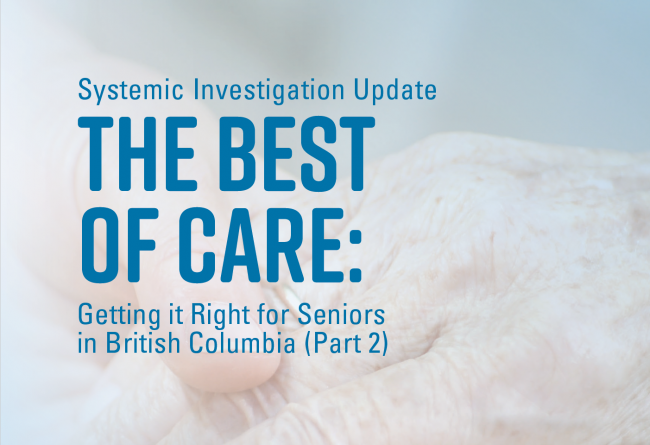Senior care: Key recommendations still not implemented seven years after Ombudsperson’s investigation
Seven years after conducting a wide ranging investigation examining seniors care and services in the province, the Ombudsperson finds a number of key recommendations are still outstanding, including legislative changes that would make significant improvements to service quality and the protection of seniors’ rights.
The Best of Care: Getting it Right for Seniors in British Columbia (Part 2) is a two-volume report released by the Office of the Ombudsperson in February 2012. The report’s 176 recommendations were designed to improve home and community care – home support, assisted living and residential care services for seniors. In an update issued today, the Ombudsperson has found that less than half the recommendations aimed at the Ministry of Health and health authorities have been implemented.
“While I recognize the Ministry has taken some steps to improve seniors’ care, the larger tangible actions we recommended seven years ago that would significantly improve the quality of care have still not been implemented,” said Ombudsperson Jay Chalke.
Key implemented recommendations include:
- The Seniors Advocate identifies, collects and publicly reports on key home and community care data highlighting trends in seniors’ services. The Advocate reports on systemic issues impacting seniors and assists seniors and their families by providing information and referrals.
- The Assisted Living Registry (ALR), which oversees the registration of and investigates complaints about assisted living facilities in British Columbia, has improved its internal procedures for investigations including time limits for responding to complaints.
- The Ministry of Health and health authorities have developed some standardized performance management requirements to measure the quality of home support services.
- Information has been enhanced for seniors who are facing financial hardship in regard to how they can have home and community care service fees reduced.
“The actions taken to date, while welcome, have mostly focused on smaller incremental improvements,” said Chalke. “Frankly, in seven years I, and I think the public, would expect more in terms of improving critically important services for our aging population, some of whom are extremely frail and vulnerable.”
Key outstanding recommendation from the 2012 Ombudsperson’s report include:
-
Enacting several pieces of legislation that have been passed by the Legislative Assembly but have still not been brought into force including:
- changes to the Community Care and Assisted Living Act that would allow seniors to live in assisted living settings longer by receiving additional care.
- Part 3 of the Health Care (Consent) and Care Facility (Admission) Act that would add safeguards to the residential care admissions process ensuring capable seniors are not being admitted against their will and that would provide for legal substitute decision-making by family members where the senior is not mentally capable.
- changes to the Residential Tenancy Act that would give tenancy protections to assisted living residents. Currently where an assisted living resident is in a dispute with their landlord, the only legally effective recourse is to go through the courts, a time-consuming and expensive option.
- additional changes to the Community Care and Assisted Living Act, to include all residential care homes currently governed by the Hospital Act. Two different legislative frameworks have meant different standards and fees for residents of each type of facility.
- Conducting a full systemic evaluation of the effectiveness and cost of the home support program – this has not occurred and the Ombudsperson continues to receive complaints about home support services, including the hours of service provided and the overall quality of care.
- Ensuring sufficient staff to meet seniors’ care needs in residential care. In 2012, the Ombudsperson recommended that a minimum standard of 3.36 daily direct care hours to each resident be achieved by 2014/15. These standards were to be monitored, enforced and publicly reported. In September 2018, government committed to provide funding that will allow the 3.36 hour standard to be met as an average across each health authority by 2021 – a target that is almost a full decade after the Ombudsperson’s initial recommendation.
- Enforcing standards of care in residential care – the report recommended that by April 1, 2014, regulatory standards would apply to areas such as bathing frequency, dental care, call bell response times and culturally appropriate services. The ministry has not yet acted on this recommendation.
“This update marks the end of our regular monitoring process, which we extended well beyond our typical five-year limit given the breadth of the original report,” said Chalke. “Having shone the light on this vital area, I am confident that advocates, community organizations, seniors and their families, and the public will continue to push for ongoing improvements to seniors’ care. My office will continue to receive and investigate individual complaints from seniors and their family members and I expect we will return to these matters as we issue summaries or reports of future investigations.”
The full report and update can be viewed at: https://bcombudsperson.ca/documents/best-care-getting-it-right-seniors-british-columbia-part-2.


























Comments